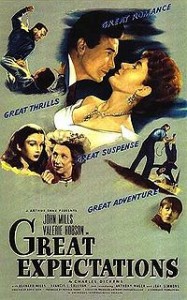“Come close. Look at me. You aren’t afraid of a woman who has never seen the sun since before you were born?” —Miss Havisham to young Pip
After having recently watched the latest TV version of Great Expectations—if these words are read much later after they first appear, there may be another version!—I’m reminded of the 1946 British film. Even then it wasn’t the first of its kind, but it is David Lean’s greatest film, one of Britain’s finest and clearly, as more and more liberties are taken with Charles Dickens’ text, the best interpretation ever seen on screen. Period.
This newest version (2011)—yes, another from the Brits—has received acclaim and blame: acclaim for its luscious photography, nineteenth-century authenticity and the gloom of those marshes; blame for the overly pretty and bland Douglas Booth as the hero Pip and for the addition of a brothel scene. Fortunately, Pip is properly indignant and exits.
Reviews have been mixed over the Bleak House and X-Files star Gillian Anderson, an American among a cast of Brits, for her jilted-at-the-altar Miss Havisham. In one sense Anderson is something of a novelty, being the “youngest” to do the role (Dickens does not specify the lady’s age), with a somewhat eccentric portrayal; in another sense there’s her macabre eye make-up and, annoying to many, an affected delivery and a girlish, pinched voice.
Dickens is indefinite about Miss Havisham catching fire. Anderson deliberately drops burning letters at her feet, becoming a silent, flaming statue, vividly photographed. In the Lean version, a small log rolls from the fireplace and ignites her tattered wedding dress. In the written Dickens, she is seated with her back to Pip so that he only sees “a great flaming light spring up.” Suicide? Inconclusive. Probably not. Typical of our modern age, and our tendency to read into things that make for more drama, suicide seems an instinctual elaboration hard to resist.
The most impressive role in the 2011 version—certainly more than Booth’s or, for that matter, Shaun Dooley’s off-center take on Joe Gargery—is David Suchet as the lawyer Jaggers. Totally different from his signature creation of Hercule Poirot, Suchet is now minus his prissy walk and French accent—er, French-Belgium accent?—even artificially deepening his voice. That touch of his taking a brief lunch on his feet, from a small stand, has its basis in Dickens: Jaggers “seemed to bully his very sandwich as he ate it.”
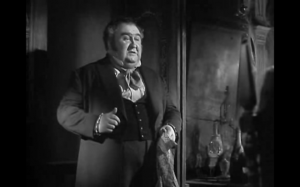 In the 1946 British film, the lawyer is played by Francis L. Sullivan, who also plays the lawyer in the 1934 American version. Sullivan, a larger man than Suchet though their general shapes are the same, makes Jaggers more casual, less belligerent than Suchet, who is so good despite his shorter screen time.
In the 1946 British film, the lawyer is played by Francis L. Sullivan, who also plays the lawyer in the 1934 American version. Sullivan, a larger man than Suchet though their general shapes are the same, makes Jaggers more casual, less belligerent than Suchet, who is so good despite his shorter screen time.
It’s interesting, that in both these versions, the actors who play young Pip are more convincing and appropriate than those who play the grown up Pip. But there’s a subtle difference. In the 2011 treatment, Oscar Kennedy as the youngster is far more “right” than the grown up adult, played by Booth. While in the Lean version Anthony Wager is close to perfect as young Pip, [intlink id=”447″ type=”category”]John Mills[/intlink], at thirty-eight, is, on the face of it, too old for the grown-up Pip. After all, a little over half way through the novel, when the convict Magwitch returns, Pip is just twenty-three. Mills, however, already young looking for his age (he lived to be 97) and well “youthified” with make-up and a wispy coiffure, comes over as a smiling, fresh-faced Pip.
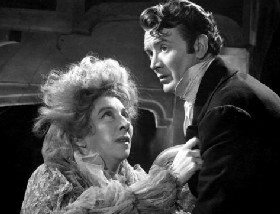 First appearing on screen in 1917, Great Expectations is probably the most-filmed of the Dickens novels, even more frequently than A Christmas Carol. This story of a young man coming into the world on his own, poverty to riches, has an undeniable appeal to modern readers and movie-goers. As scholar Walter Allen wrote, Pip is “perhaps Dickens’ finest character in a more or less naturalistic mode . . . ” And few characters, aside from maybe Ebenezer Scrooge, linger so vividly in the imagination as Miss Havisham or Abel Magwitch.
First appearing on screen in 1917, Great Expectations is probably the most-filmed of the Dickens novels, even more frequently than A Christmas Carol. This story of a young man coming into the world on his own, poverty to riches, has an undeniable appeal to modern readers and movie-goers. As scholar Walter Allen wrote, Pip is “perhaps Dickens’ finest character in a more or less naturalistic mode . . . ” And few characters, aside from maybe Ebenezer Scrooge, linger so vividly in the imagination as Miss Havisham or Abel Magwitch.
The longest gap between productions was possibly that between 1946 and 1974, when a joint U.K./U.S.A. effort produced a TV movie with Michael York as the mature Pip and James Mason as the convict.
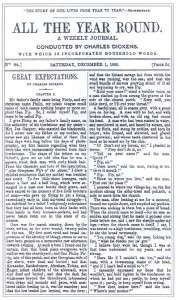 Since Great Expectations first came out in serial form, published in thirty-six consecutive issues of the weekly periodical All The Year Round, beginning in December 1860, the novel is easily adapted to its modern serial counterpart, the TV mini series, albeit in larger chunks. One such mini series, this time from the BBC in 1981, stars Joan Hickson as Miss Havisham and Gerry Sundquist as the mature Pip. Hickson gained her greatest fame as one of the first of many BBC Miss Marples in a series of Agatha Christie murder mysteries.
Since Great Expectations first came out in serial form, published in thirty-six consecutive issues of the weekly periodical All The Year Round, beginning in December 1860, the novel is easily adapted to its modern serial counterpart, the TV mini series, albeit in larger chunks. One such mini series, this time from the BBC in 1981, stars Joan Hickson as Miss Havisham and Gerry Sundquist as the mature Pip. Hickson gained her greatest fame as one of the first of many BBC Miss Marples in a series of Agatha Christie murder mysteries.
It would be folly to say it’s difficult to mess up Great Expectations. The plot and diverse characters have so much going for them, but disasters have occurred. Disregarded as a travesty of Dickens, the 1986 Australian TV movie Great Expectations: The Untold Story realigns much of the plot, making the convict the central character. It stars John Stanton as Magwitch and Todd Boyce as a secondary Pip.
Although not next in this chronology, the 1998 theatrical movie, weirdly directed by Alfonso Cuarón, should be mentioned alongside The Untold Story. A travesty in its own right, this modernization is set in a Florida swamp and later New York City, with several miscastings and many character name changes. Ethan Hawke is another-named Pip, Gwyneth Paltrow a sultry Estella (name kept), Anne Bancroft a crude Miss Havisham-like Ms. Dinsmoor and Robert De Niro a prisoner, alias Magwitch.
The remakes continue hard and fast. Around 1991 the British were at it again, this mini series distinguished by two ideal castings—Anthony Hopkins as Magwitch and Jean Simmons as Miss Havisham. A sixteen-year-old Estella in the 1946 version, Simmons, at sixty, is now old enough to be a convincing Miss Havisham. John Rhys-Davies, who had just made Indiana Jones and the Last Crusade, was a rather healthy looking Joe Gargery.
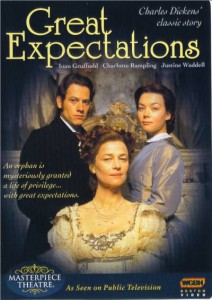 Nor is another BBC TV movie to be forgotten, this in 1999. Its possible distinction is Ioan Gruffudd as the mature Pip. Gruffudd, now starring in the current U.S. television series Ringer, first came to prominence in the Horatio Hornblower TV series. Also starring are Charlotte Rampling as Miss Havisham and Justine Waddell as Estella.
Nor is another BBC TV movie to be forgotten, this in 1999. Its possible distinction is Ioan Gruffudd as the mature Pip. Gruffudd, now starring in the current U.S. television series Ringer, first came to prominence in the Horatio Hornblower TV series. Also starring are Charlotte Rampling as Miss Havisham and Justine Waddell as Estella.
And a return to the 2011 BBC mini series ends the chronology, not intended as inclusive. But without a chance to catch a breath or two, the next version—certainly not the last!—is due out sometime this year, an attempt that will star Jeremy Irvine as Pip and Helena Bonham Carter as Miss Havisham. After her quiet, strong role as wife to George VI in The King’s Speech, expect a certain extravagance, à la Gillian Anderson, in her portrayal.
The plot of the 1946 Great Expectations is devoutly faithful to the original Dickens. A young orphan lad, Philip Pirrip (Wager), called by one and all Pip, lives with his sister and her husband Joe Gargery (Bernard Miles), the blacksmith. This is all revealed in the introduction and first scene, when Pip visits the graves of his mother and father.
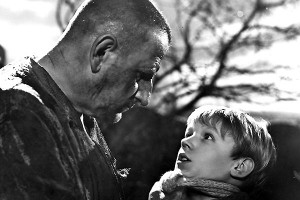 Pip is snared by one of two escaped convicts, Abel Magwitch (Finlay Currie). The fugitive demands and threatens the boy: “Now you bring that file and them wittles to me in this church yard tomorrow morning early. . . . And never dare to say a word of having seen such a person as me. . . . If you do, your heart and liver’ll be torn out, and roasted, and et.” Pip brings the file and a pork pie, but the convict is captured and hauled away.
Pip is snared by one of two escaped convicts, Abel Magwitch (Finlay Currie). The fugitive demands and threatens the boy: “Now you bring that file and them wittles to me in this church yard tomorrow morning early. . . . And never dare to say a word of having seen such a person as me. . . . If you do, your heart and liver’ll be torn out, and roasted, and et.” Pip brings the file and a pork pie, but the convict is captured and hauled away.
A recluse, Miss Havisham (Martita Hunt), requests that the boy visit her regularly at her crumbling home, Satis House. On that first visit, Pip finds her, as she remains throughout, in a shabby, floor-length dress. The long dining table remains set as it was many years ago, cobwebbed and decaying, and heavy curtains block all light from the outside. Living with her is a young girl, Estella (Jean Simmons), who, in a card game, ridicules Pip for calling the knaves jacks and says, “You stupid, clumsy, laboring boy.”
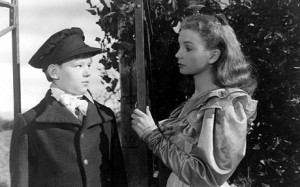 ([intlink id=”720″ type=”category”]Jean Simmons[/intlink] is seen only in the early part of the film as the young Estella, but, however brief, there is something about her performance which catches in the memory. Her girlish attire and beauty contrast with her cruel treatment of the boy.)
([intlink id=”720″ type=”category”]Jean Simmons[/intlink] is seen only in the early part of the film as the young Estella, but, however brief, there is something about her performance which catches in the memory. Her girlish attire and beauty contrast with her cruel treatment of the boy.)
The mature Pip (Mills) becomes an apprentice blacksmith to Gargery and his visits to Miss Havisham end. One night, the forge is visited by the London lawyer Jaggers (Sullivan), announcing that a secret benefactor has provided money to turn Pip into a gentleman of “great expectations.” The only stipulations are that he retain the name Pip and keep to himself any suspicions he might have about the identity of this benefactor.
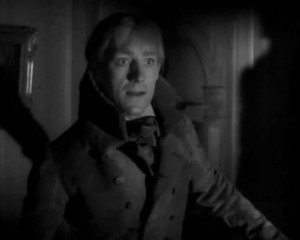 In London, Jaggers’ clerk Wemmick (Ivor Barnard) sets up Pip to room with Herbert Pocket ([intlink id=”813″ type=”category”]Alec Guinness[/intlink]), who will instruct him in the ways of a gentleman and who, as a boy visitor to Miss Havisham’s, had challenged Pip unsuccessfully to a fist fight. It’s from Herbert that Pip learns the reason for that decaying house, why all the clocks have stopped at the same time: Miss Havisham was jilted at the altar, and as revenge “on all the male sex,” has raised Estella to break any suitor’s heart.
In London, Jaggers’ clerk Wemmick (Ivor Barnard) sets up Pip to room with Herbert Pocket ([intlink id=”813″ type=”category”]Alec Guinness[/intlink]), who will instruct him in the ways of a gentleman and who, as a boy visitor to Miss Havisham’s, had challenged Pip unsuccessfully to a fist fight. It’s from Herbert that Pip learns the reason for that decaying house, why all the clocks have stopped at the same time: Miss Havisham was jilted at the altar, and as revenge “on all the male sex,” has raised Estella to break any suitor’s heart.
By now, the mature Estella (Valerie Hobson) is also in London and now a lady, being pursued by Bentley Drummle (Torin Thatcher), whom she admits to Pip she does not love. During a stormy night, Pip receives a frightening visitor who reveals that he is the mysterious benefactor. The man, who had escaped to New South Wales and made a fortune, is Abel Magwitch. Owing to those boyhood visits with Miss Havisham and that Jaggers is also her lawyer, Pip had assumed she was the benefactor.
Pip now confronts Miss Havisham and, realizing she had only used him, says, “I am as unhappy as you could have ever meant me to be.” When her wedding gown catches fire, he smothers her with the rotten cloth from the long table, scattering the cobwebbed candelabras, decayed cake and tarnished silver, “the disturbed beetles and spiders running away over the floor,” as Dickens describes it. Miss Havisham dies.
While recovering from his burns, Pip learns that an enemy of Magwitch (the other convict with him in the graveyard) is in London. Together, Pip and Herbert arrange to smuggle him aboard a passing packet boat. The police foil the plan and Magwitch is badly injured in a fight with his enemy. Before Magwitch dies, Pip tells him that his long lost daughter, Estella, is alive and that he loves her.
In the final scene, Pip returns to the deserted Satis House. In entering the gate, walking through the garden, seeing the clock frozen in time and climbing the stairs, he recalls those voices from long ago, those of Miss Havisham, of that little girl, even of Jaggers. To his surprise, in Miss Havisham’s old room he finds Estella, who says her engagement ended when Drummle discovered her lowly origins. When she announces she will live alone in the house, Pip tears away the curtains and opens the windows to the fresh air. He reaffirms his love and the two walk out of the house together.
That Estella is Magwitch’s daughter is one of many coincidences, a Dickens trademark, for which he is famous—and criticized, even in his lifetime. A coincidence, too, that Molly, Jaggers’ chambermaid, is Estella’s mother. That Miss Havisham and Pip have the same lawyer. And that Herbert Pocket, the boy from Miss Havisham’s, is the young man Pip later rooms with in London. “The idea of its being you!” they say in turn when they recognize one another.
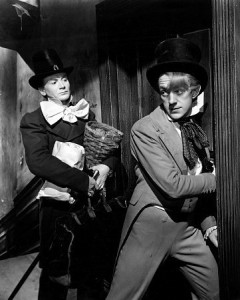 Like the novel, the 1946 Great Expectations is resplendent with memorable scenes. Most famous is young Pip’s meeting with Magwitch in the cemetery. Pip’s first visit to Miss Havisham’s is heralded by composer Walter Goehr’s strident trumpet. From an upstairs window, young Estella calls, “What name?” A five-note motif is heard as she descends to open the gate. Pip follows her and her candle through the house and up the stairs. Lively strings alternate with chirping woodwinds, followed by first pulsating, then pizzicato strings—kinetic music of anticipation beneath a visual aura of uncertain gloom.
Like the novel, the 1946 Great Expectations is resplendent with memorable scenes. Most famous is young Pip’s meeting with Magwitch in the cemetery. Pip’s first visit to Miss Havisham’s is heralded by composer Walter Goehr’s strident trumpet. From an upstairs window, young Estella calls, “What name?” A five-note motif is heard as she descends to open the gate. Pip follows her and her candle through the house and up the stairs. Lively strings alternate with chirping woodwinds, followed by first pulsating, then pizzicato strings—kinetic music of anticipation beneath a visual aura of uncertain gloom.
Then there’s the both mysterious and frightening return of Magwitch to Pip during that stormy night, shot accordingly and true to Dickens. In that 2011 TV mini series, there is no storm—losing much atmosphere from the start—and the dialogue is shorn of Dickens’ suspenseful original, when Pip, first fearful of his life, slowly, disbelievingly, realizes the man’s identity and that he is his benefactor.
The 1946 version retains Dickens’ crafty use of questions. “Could I make a guess, I wonder,” said the convict, “at your income since you come of age? As to the first figure, now. Five? . . . Concerning a guardian. . . . As to the first letter of that lawyer’s name, now. Would it be a J? . . . I wrote from Portsmouth to a person in London for particulars of your address. That person’s name? Why, Wemmick.”
The book Great Expectations had a postscript. After the serial publications were complete, and Dickens was preparing for the book printing—the novel would be issued in three volumes—the author’s publisher, Bulwer-Lytton, suggested that he should alter the original harsh fates of Pip and Estella. The author agreed, went home and in four days changed the ending so that, as Dickens biographer Peter Ackroyd writes, “it is indeed softened like the evening mist with which the book ends.”
It is, of course, the ending known, and endlessly filmed, today.
